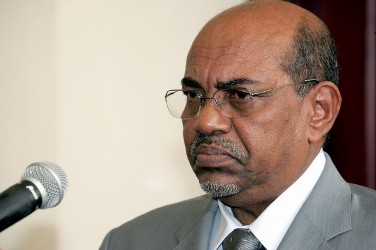Sudanese opposition forces call to overthrow Bashir’s regime
June 20, 2012 (KHARTOUM) — Sudanese opposition forces slammed the recent austerity measures announced by Presient Omer Al-Bashir to overcome the severe economic and called to overthrow the regime.

In different statements on Wednesday, the Sudanese opposition and rebel groups said regime policies led to the bankruptcy of the country and exacerbated the suffering of Sudanese people during the past years.
In a call to topple the regime, the Sudanese Communist Party said the plans announced by Bashir last Monday are only “administrative measures” that do not bring true and radical solutions to end the economic collapse the country is witnessing.
The communist party called on the Sudanese “to take to the streets to overthrow the regime”, stressing the government did not leave any other alternative.
The opposition forces say the austerity plan announced by the government did not affect the huge budgets of the army, police, security apparatus, and sovereign sector which acquire 70% of wages and salaries line or 56% of the whole 2012 budget.
The communist party said only 30% of the budget is concerned with the drastic measures including the cut of 380 constitutional positions.
The opposition party went to explain that the recent salary increase the government decided will be swallowed up by the unprecedented hike in fuel and commodities prices.
Gahzi Salah Edeen, presidential adviser and head of the dominant NCP caucus in the National Assembly acknowledged Wednesday that the government started late to address the economic issues due to the war against rebel groups.
“If the other party refuses to stop the war, what do we do?” he further said; stressing that the economy is national security issue.
Justice and Equality Movement foreign relations secretary Ahmed Hussein Adam said in a statement he sent to Sudan Tribune that “what is happening in Sudan these days is the beginning of a true revolution” embracing their revolution in a critical historical moment.
He further renewed his call for” all the forces of change in rural areas of Sudan and its cities” and the armed forces to reunite their efforts to work with the rebel alliance, Sudan Revolutionary Forces (SRF), for the salvation of the country from the “authoritarian ruling junta” of Bashir.
He also called on the political forces to find out an exit strategy to achieve comprehensive peace, democracy, justice and unity. He further emphasized that the crisis is in essence a political crisis and there should be a comprehensive political solution.
SRF rebel groups refuse to hold separate talks on their respective regional issues and demand a comprehensive process to tackle Sudan’s crisis. They also say regime change is their main objecrtive.
Mubarak Al-Fadel Al-Mahdi, leading figure of the Umma National Party, called in a statement emailed Sudan Tribune on the President Omer Al-Bashir to hand over the power to the army in order to achieve peaceful democratic transition in the country.
He went further to say that the army will remain in power for three months during which the military will hold a constitutional conference attended by the all the political forces and armed groups to adopt a new constitution and a national interim government.
This government, according to Mubarak, will end the armed conflicts in the country and normalize relations with the South Sudan before to achieve an economic and social unity and political cooperation as well.
The exiled deputy leader of the Democratic Unionist Party Ali Mahmoud Hassenein, urged the regular forces to join the Sudanese people in its revolution against the regime.
“The armed forces which are the conscience of the nation do not take the side of tyrants but stand by the masses,” he said.
He referred to the recent move of the Libyan army but avoided mentioning the current political tensions between the military and political forces in Egypt.
Impacted by the Arab spring, last January Sudanese protesters failed to keep up their demonstrations in the street as they were brutally stormed by the police and security forces.
The protests in Khartoum remain limited to the universities as the police tightened security measures to avoid its extension to the streets and the involvement of other sectors.
(ST)
